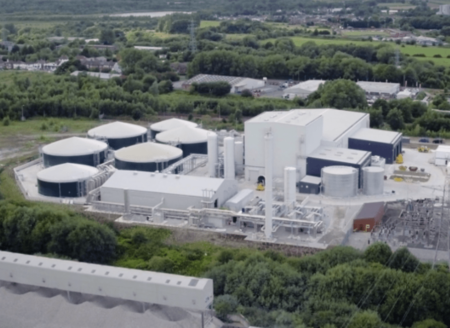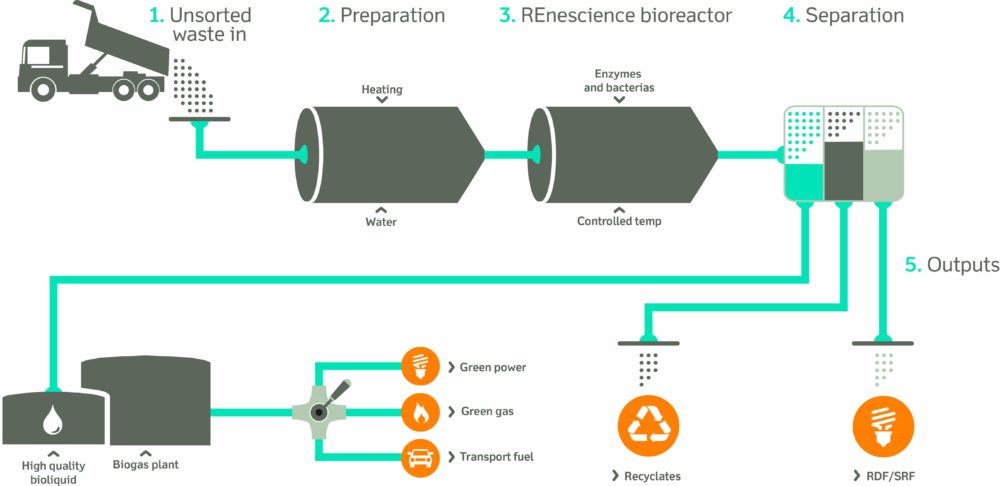A “first of its kind” plant designed to treat residual waste using enzymes is expected to be fully operational ‘in the first half of 2019’, after a series of delays relating to equipment used in the facility.
The company behind the Renescience EfW plant in Northwich, had previously stated that the facility would be completed in 2018, having been pushed back from an initial 2017 opening date.

Danish-owned Ørsted, formerly Dong Energy, is looking to complete the Renescience plant in the early part of 2019
Danish-owned Ørsted, formerly Dong Energy, which is developing the facility has said the delay in the opening of the 120,000 tonnes-per-year capacity facility had come about due to ‘mechanical challenges’ involved in the treatment process.
Despite having yet to be completed the facility was among those to be featured as a case study in the government’s recently issued Resources and Waste Strategy.
According to the Strategy, the technology could be used to recycle unsorted waste in areas with low rates of sorting refuse – such as high-density housing.
Development of the facility was first announced in 2016. The plant is designed to treat unsorted residual waste using enzymes to create a ‘bioliquid’ and solid recovered fuel, while also generating electricity.
This process would also, the company claims, see recyclable material separated out from the residual waste fraction.
Equipment
A spokesman for Ørsted has told letsrecycle.com that the company had faced challenges in optimising the mechanical operation of the plant – prompting a need to install additional equipment to improve the efficiency of the process.
He said: “The Renescience plant has been operating on real waste since summer 2017. The enzymatic process is working as expected and producing bioliquid and clean recyclables, whilst generating electricity for the UK grid.
“We have recently started work on an extension to the existing facility, which we believe will help overcome some of the challenges we have experienced in optimising the plant’s mechanical operation.”
Ørsted
“We have recently started work on an extension to the existing facility, which we believe will help overcome some of the challenges we have experienced in optimising the plant’s mechanical operation. The extension will incorporate additional processing equipment, as well as further storage and maintenance areas, increasing reliability and efficiency of the plant.
“We received planning approval for the extension from Cheshire West and Chester Council in November 2018 and work is now underway. We expect the facility to be fully operational in the first half of 2019.”
Process
According to the developer, the facility works by mixing together warm water and waste inside a sealed vessel, alongside enzymes which break down organic matter. Once organic matter has been extracted recyclable materials can be recovered alongside a solid recovered fuel fraction. Inert materials, such as sand, gravel and glass, are also recovered for reuse as aggregates.
The separated organic material is recovered as a thin bioliquid, which is digested by bacteria within a sealed anaerobic digestion vessel to produce biogas. A digestate product will also be produced from the AD phase of the process. The design is based on a demonstrator plant operated in Denmark.

Delays have related to the sorting aspect of the operation, with Ørsted having faced problems with a ballistic separator, which the company said “requires high maintenance and is resulting in it being taken off line for maintenance, on average every other day”. Two new separators are being installed to address this.
New buildings are also being erected to ease “congestion” from plant and machinery in the existing loading hall, allowing “the floorspace available to be increased to enable the layout to be rationalised and HGV loading to take place within the building”, planning documents submitted to Cheshire West and Chester council suggested.
Waste for the facility is to be supplied by FCC Environment, expected to be sourced from the north of England and the midlands.
Related Links
Ørsted – Renescience
The post ‘Mechanical challenges’ delay Ørsted bioliquid plant appeared first on letsrecycle.com.
Source: letsrecycle.com Waste Managment



